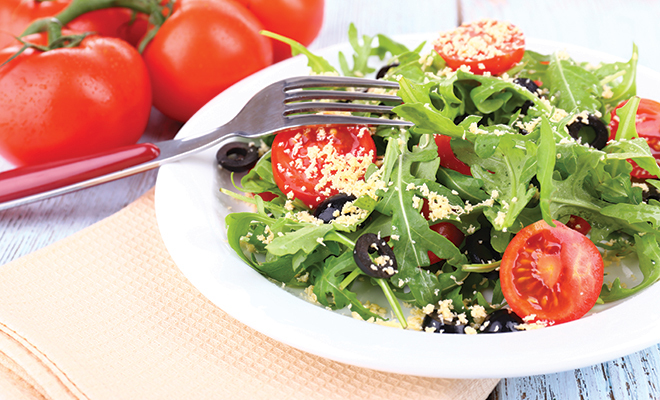
Ingredients to Aid Digestion
“Don’t eat that! You’ll spoil your dinner!” As kids, this is how we learn that delicious foods we love just might cause a stomachache – or worse. This is difficult news to digest!
Adults understand that the real message is good nutrition. Snacks and treats have their place, in limited amounts. But excess sugar, salt, fat and carbohydrates cannot support our bodies; we need protein, fruit and vegetables.
The rules for a balanced diet are well known: three meals a day with protein, lean meats, a rainbow of fruits and vegetables, complex carbohydrates such as sweet potatoes or steel-cut oats, and plenty of water. Daily requirements for calories, fat, fiber and sodium are easily available from healthcare providers and online resources.
But in real life, rules are made to be broken! Breakfast, if it’s not skipped, may be pastries or fast food. Lunch, if it’s not skipped, might be fried, salty foods washed down with a super-sized soda. At the end of the workday, those skipped meals result in high-fat snacks before dinner, or the family may make more stops at a fast-food window on the way home from work, school and after-school activities.
In my childhood, I recall two products for relief from “tummy issues” in our medicine cabinet: Pepto-Bismol® and Phillips Milk of Magnesia. Choosing one or the other could solve whatever ailed you. But today, choices for various digestive aids in the home medicine cabinet have multiplied throughout the alphabet: Beano®, Gas-X®, Imodium®, Lactaid®, Maalox®, Metamucil®, Miralax®, Mylanta®, Nexium®, Pepcid®, Tums® and Zantac®, to name a few.
Why do we feel a need to give ourselves a dose of medicine to offset what happens when we eat food?
It seems to me that people take better care of their cars than their bodies. You know exactly what type of fuel your car needs for top performance, and you would never put diesel fuel in a car that needs premium unleaded gasoline. And yet, how aware are you of what food your body needs be most efficient?
If you’ve reached a point where you are managing a health problem, of course you should consult your doctor about changes in diet that are best for you. But if you want to optimize your health and support your body’s digestive process, a simple change in diet will help you succeed. You’ll notice I used the word simple; changing your eating habits is not always easy.
Begin by editing your pantry and refrigerator. Discard processed foods high in sugar, fats, salt and starches. Then, stock up on fresh, whole foods (fruit, leafy greens, starchy vegetables and complex carbohydrates such as sweet potatoes and steel-cut oats.) Too scary? Start small. Implement these changes by “eating clean” just one day a week, then ramp up as you become more at ease.
Begin meals with a glass of water. This will help hydrate your body and boost the signal your brain receives that your stomach is full during the meal.
Breakfast will ideally combine protein, greens or vegetables and complex carbs to properly fuel your body. Think of having salad for breakfast: sliced tomato and avocado with canned chickpeas and a poached egg, or chicken sausage with greens rolled in a sprouted corn tortilla and dressed with olive oil, balsamic vinegar, fresh ground pepper and sea salt.
At lunch and dinner, aim to have a plate containing four ounces of lean protein, a cup or two of leafy greens, and a half cup of complex carbs or starchy vegetables. If your body needs more protein, just increase the ratio of vegetables and carbohydrates. This provides nutrients your body needs in the right proportion, and the additional greens, vegetables and carbs will satisfy hunger as well as provide your digestive tract with fiber. If you prefer the simplicity of smoothies rather than preparing a meal, combine whole fruit with protein powder, a handful of greens, and perhaps a tablespoon of honey.
Fine-tune your source of fuel by experimenting; remove certain foods from your diet for a couple of weeks. Some people swear that a gluten-free diet gives them more energy. Others find that they are better off without dairy, or rice, or eggs. Your body is unique; try isolating some foods for a couple of weeks. If you feel better, it’s good to know. But you don’t have to give up those foods for life; just use them in moderation.
Remember, you get to choose whether you eat to live, or live to eat.
Foods That Help Your Body Digest
Yogurt: Helpful bacteria
Whole grains: Fiber
Bananas: Potassium, fiber, electrolytes
Ginger: Nausea relief
Sourdough bread: Probiotic digestion aid
Foods That Hinder Digestion
High-fat, fried food: Acid reflux/heartburn
Spicy food: Heartburn
Dairy: Lactose intolerance
Alcohol: Heartburn
Coffee, tea and soda: Excess stomach acid
Corn: Indigestible cellulose
Sources: health.com; Optimal Digestive Health: A Complete Guide, editors T. W. Nichols, MD, and Nancy Faass, MSW, MPH, Healing Arts Press, Rochester, VT, 2005; Pandora’s Lunchbox, Melanie Warner, Scribner, New York, NY.







